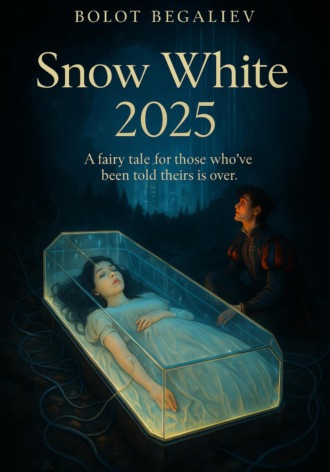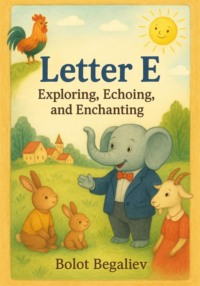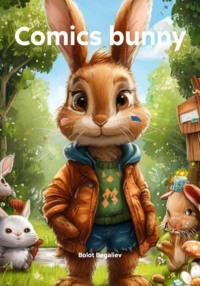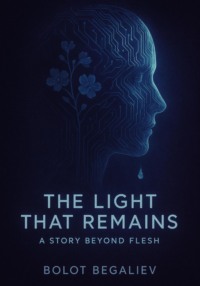
Полная версия
Snow White 2025 fairy tale for those who’ve been told theirs is over
The King approached and quietly said: “Do you want us to find a machine too?”
She nodded without looking and replied:
“I do. But not just to leave—
to be able to return.
Whenever I wish.” That evening, they sat by the fireplace.
The wood crackled. Rain fell softly outside—
as if the world, too, was remembering. “I used to think magic was crowns and dreams,” the King said.
“Or kisses. Or fairy dust.”
He stirred his tea.
“But today I realized—magic is work. Every day.
When you make your own morning.
When you wash, and study, and clean.
When you grow goodness.” Snow White looked at him, and the firelight trembled in her eyes. “And magic is also understanding. Not just each other—but yourself.
Why you’re here. What you can do.
Who you want to become.”
The King sighed—not heavily, but freely.
He stood and paced the room.
Looked at the books, the globe, the old suitcase with tools. “We’ll build our own magic. With our own hands.”
“What about actual magic?” she asked with a smile.
“Magic is simply mind, effort, and love—fused in one heart.
And a desire to learn.
In a world where planes fly and children heal their toys—magic exists,
if you are its source.” The Next Day. The King signed up for classes.
He wanted to study machines and technologies,
and build homes where children would feel safe. Snow White enrolled in evening school.
She loved reading, counting, writing—and drawing her own fairytales.
They knocked down a wall and built a library.
Installed solar panels.
Added stairs to the attic and made a workshop there.
It smelled of books and coffee.
And inspiration returned. A month later, a man in glasses stood at their door. “I design small time machines,” he said.
“For brief journeys—back to your younger self. Or a favorite evening.
Or even just 15 minutes ago—so you can hug someone again.” The King smiled: “We’re ready.”
so Snow White got her own time machine.
Small. Modest.
With soft light and a cozy chair. It didn’t travel far.
But it could bring her back to the moment Lily laughed,
or Cinderella waved,
or trees whispered by the Lake of Wonders. And on those short trips,
Snow White brought tea, walnuts, a kind book—
and a royal hand, warm and steady. In the evenings, they returned to their work. Because they now understood:
In a world where magic is everyday effort,
love is a skill,
and the fairytale—
is the path you walk with your own feet. Fawns. Morning was crystalline. The air sang of grasses, and the sun slipped through leaves like a melody. Snow White gathered mushrooms, singing. Her voice was light and deep, like a lake reflecting the sky. Around her, forest creatures gathered—hedgehogs, squirrels, birds, even an old turtle from a nearby pond, drawn by her song.
Suddenly—there came pounding hoofbeats and heavy breathing. Two skinny fawns burst from the trees, panting, eyes filled with fear. “Snow White!” they squeaked, rushing forward. “It’s us… the boys. Not deer. We’re hiding.” She dropped to her knees, eyes wide. “Hiding? From whom?” “From the wicked stepmother…” one whispered.
“She wants us dead…” the other added softly. They spoke in a tremor, interrupting each other:
“We are the sons of King Mountain.”
“Our mother died in childbirth.”
“Our father remarried.”
“Our stepmother said she’d bear him puppies…”
“And we must be… replaced.”
“She ordered servants to take us into the forest and kill us. But they spared us.”
“They let us go, and we fled.”
“Then a doe took us in.”
“She fed us, sheltered us under grass and wood.”
“We grew up to the whispering wind and the scent of herbs.”
“And today… we heard your voice.”
“We stopped. It sounded like the sun.”
“And we remembered—we are children again.”
Snow White trembled as she took their small hands. “Oh, my poor ones,” she said softly. “Come. I will feed you, sing to you, comfort you.” The palace was humble—old, but bright. The kitchen smelled of nut bread, honey, and apples. She seated the boys by a window, served them porridge with cherry jam, and gave them herbal tea. “You are safe now,” she told them.
“And I will write to King Mountain. He must know.” “What if the letter reaches the stepmother…” the boys feared.
“Don’t worry,” Snow White reassured. “I’ll ask the Professor.” The moment she said his name, the wind burst into the courtyard. Leaves fluttered. A swirl of light formed, and out stepped Professor Shaggy. "You called?" he asked, adjusting his glasses.
"Ah," said Snow White, "we never properly said goodbye last time."
He flushed. "Forgive me. I felt your sorrow and disappeared. But now… I'm here." “We’re in trouble,” she told him, and explained everything. The Professor listened quietly, stroking his beard. “I will deliver the letter directly to King Mountain. Don’t worry. These boys… you will keep them safe until everything is settled.” He disappeared as suddenly as he had come—leaves rustled in his wake. On the windowsill lay a note:
“While truth travels, be kind. It already changes the world.” That evening, Snow White sang again. The fawns—now once more boys—slept on a soft blanket by the fire. Small animals snored nearby. Outside, the forest murmured:
“You sing—and the world breathes.
You listen—and the world heals.
You care—and that is already magic.”
Elsewhere, in a distant palace, King Mountain held Snow White’s letter. Tears filled his eyes as he rose, ready at last to search for his sons. The Royal Ball. On a forest clearing where lanterns glowed even at night and stars sang through the branches, a gong resonated—thin, silver—echoing across the fairy-tale realm. “An invitation,” Snow White whispered, opening the letter.
“Look—we’ve gotten one too!” exclaimed Cinderella, stepping from the time machine with her daughter and son in arms. “A royal ball?” asked the King, straightening his tie. “Will there be dancing?”
“Stories,” came a voice from nowhere. “And pies. And new fairytales. The whole kingdom is stirring. Fairies are steaming gowns. Animals are polishing boots. Chickadees rehearse fanfares.” The Professor, naturally, had invented a carpet to whisk latecomers to the palace just in time. Cinderella and Snow White walked the carpet path, hand in hand.
“Sometimes it feels like the fairytale has ended,” Cinderella whispered.
“But then we find each other—and it begins again,” Snow White smiled.
The palace was built inside the Story Mountain—tall, luminous, echoing with all the tales ever told. Guests had gathered:
Beauty & the Beast (now an art therapist and gardener)
The Little Mermaid (running a sea-school for young dreamers)
Rapunzel (founder of a haircare charity for girls)
Sleeping Beauty (an expert on sleep and mindful dreaming)
Red Riding Hood and her grandmother—traveling bloggers.
Each heroine was to share one story—not the childhood tale, but what happened after: “The truth of the story,” called the host, an elderly gnome in spectacles. “Snow White first,” announced the stage. She rose, hands trembling, but light filled her eyes. “When I awoke in a new world,” she began, “no one knew who I was. They didn’t recognize me. I washed dishes, looked for work, learned. But love stayed. And song stayed. I realized that every awakening is just the beginning.” The hall fell silent… then erupted in applause. Cinderella stood beside her.
“And I,” she said, “gave birth to twins, lead a battalion—and still search for my glass slipper. But I learned one thing: to say ‘no’ when others say ‘shush.’” Laughter. Joy. Celebration. The ball continued until dawn—not only with dance, desserts, and trumpets, but with truth. Each heroine revealed her real self—no longer fictional, but human. When Snow White returned home, she wrote in her journal:
“I am no longer afraid to wake up—
Because now I know that a fairytale is not what was,
But what we create each day.
With love. With song.
And maybe a drop of magic.”
A Mermaid’s Tale.
At the ball, lights reflected off crystal sea-necklaces, and the Little Mermaid rose from her seat. Tall, strong, eyes the color of surf, she stood beside Snow White and Cinderella. “You know my name. But tonight, I came to speak of her—my daughter. Her name is Watercolor.” “When my own story ended,” the Mermaid began, “I dove deep into the seas, choosing solitude, until I heard a song from within—a quiet, stubborn pearl in a shell. That song said: learn to love again. And there she was: Watercolor.” “I don’t know where she came from—perhaps from music, from my heart, from ocean foam and sun. But one day I woke holding her. She was different. She could live in water and on land. She painted with rain. Spoke to seagulls. Heard music in stones. And she asked too many questions.” “Mom, why did you stay silent when they said you must?
Mom, what if I don't want to be a princess?
Mom, why do you cry when you sing?” The Mermaid smiled with tears in her eyes. “My daughter didn’t want to be a story. She wanted to be a person, an animal, a wave, a melody. She says: ‘I am not part of your tale. I am the start of my own.’ “On her seventh birthday, I gave her a voice. A real voice—not kept in a shell, not hidden in a song. A voice that can say ‘no’ and ‘yes,’ that can shout or laugh or be silent when she wants.” “And do you know what she sang first? Not a ballad. Not an aria. Not a hymn. A silly, funny, sunny song about an octopus that loves to dance the rumba.” The audience laughed—even the gnomes. The Mermaid bowed. “That is our story. A mother learning again. Learning to be free. And teaching her daughter to do the same.” Silence fell, then applause erupted—Story Mountain itself echoed with ovation. Snow White hugged the Mermaid. “I want to meet Watercolor.”
“She’s painting a portrait of the wind on the beach,” the Mermaid smiled. “Come, she’ll show you.” From backstage someone whispered: “Next story… from Rapunzel.”
“Or maybe Red Riding Hood?”
“Or… someone you didn’t expect.”
Rapunzel. At the Queens’ Ball—where stories of Snow White, Cinderella, and the Mermaid had already been told—Rapunzel rose, her movements as gentle as dawn. Her hair was no longer the floor-length braid of legend. It was cropped short, like the breath of spring, adorned with tiny flowers—not for beauty, but simply because she wished it.
“I lived in a tower,” she began slowly. “For a long time. But the tower wasn’t only on the outside—it was inside me too.” Even after she descended, met the prince, and danced her first free step, she still lived within it. “Do you know what my walls were?” Words “You can’t do it… ” “The world is dangerous.” “Better not stand out.” “You’re too sensitive.” “Too loud.” “Too fragile.” “Too much you.” She paused—softly, like a step on dewy grass.
“One morning I woke up and told myself: ‘Too much’ is my magic. And if someone thinks I can’t do it, then it’s their fear, not mine. I cut my hair—not to hide, but so it could grow anew. I went to study. I opened a workshop fixing music boxes. I walked barefoot—even in winter. I wrote poetry that no one understood—and that was wonderful. I fell in love with someone who wasn’t a prince. A librarian, smelling of coffee and ink, who read aloud even while I slept. “I noticed… towers crumble not from kisses, but from steps—one after another. And if a tower remains within you—don’t fear. There’s already a door in it. You just haven’t found it yet.” In that moment, one of the orchestra’s princesses wept—then another—and applause swelled like wind. “Thank you,” whispered Snow White. “That was… needed.” “Each of us,” Cinderella smiled, “has lived in a tower. But we’re here. So, the path exists.” Little Red Riding Hood. With the applause still echoing, a girl in a red hood stepped forward. Though no longer a child, nor simply a granddaughter, she came slowly, placed a basket of pies, jam, and books on the stage, and said: “Everyone thinks I’m just the one who walks through the forest to Grandma’s. And that I must meet the wolf. But do you know what I learned?” The audience hushed. “Wolves exist not only in forests. They appear in the news. In private messages. In the voice inside your head: ‘You’re too slow.’ ‘You’ve lost your way again.’ ‘You’re worthless.’ “For a long time, I believed the forest was danger. But then Grandma said: ‘The forest is life. Walking through it is how you grow up.’
“A wolf once ate my grandmother. Then I ate a cloudberry pie. Life goes on—strangely enough. Now Grandma and I live together. She got a cat; I started a journal. The cat is named Dog—because he acts like one. I go to forest school and sometimes teach—‘How to tell a real wolf from a disguised one.’ Secret: wolves always speak loudly. You must learn to listen quieter.” The audience chuckled respectfully. “My main takeaway? It’s not scary to walk through the woods. It’s scary to always wait to be eaten. I wear my red hood not to be seen—but so I don't lose myself. Also, pies are here—if you want one. Just don’t be a wolf.” Laughter and applause filled the hall. Snow White winked. Cinderella dabbed her eyes. Rapunzel whispered: “She needs a cat.” The Snow Queen. A cool breeze swept through the hall; icicles on glass chandeliers tinkled; candles dimmed. And then—she entered. The Snow Queen, unhurried. Uns miling. Bringing dusk in her wake. She stood at the center, wearing no crown—only a sheer veil like frost on a window. “I was called cold because I didn’t burn. They labeled me emotionless. But I simply… did not glow.” “While you played at love, I played at silence. While you sent letters, I listened to snowflakes sing.” The hall fell silent—even the hearth’s fire dimmed. She continued: “Then a boy named Kai… removed the ice from my heart—and found me. I wasn’t a monster. I was his fear. His grief. Then I became his peace. Since then, I no longer live in a palace. I live on the northern shore. I grow ice roses, gather stars, bake cardamom cookies. Children come sledding—and none of them freeze.” She smiled—tender and true. “Cold can be home—if it holds warmth.” Snow White brushed away a tear. Red Riding Hood murmured: “I’d love to visit…” A young woman in a plum-colored coat stepped forward, eyes bright with hope. Gerda’s Call “I’m Gerda. I know how to find any lost soul. I founded a foundation—to protect the Arctic—and the Snow Queen—from warming, and from indifference. Because ice is melting. Not just in oceans—but in hearts. And that's even scarier. If you have ideas… to save winter, to defend the North, to cool foolishness and kindle care—write to me. A kind word, a project, a song.” She paused, addressing the hall: “Letters arrive by mail—my address: gerda@snowlove.org. Or drop them in the wind—because I am a seeker.” The Snow Queen stepped forward, embraced her, and the hall filled with the dance of snow. A musician began playing a timeless winter melody.
After the Ball The music had faded.
Home. Silence and candlelight.
They sat side by side, warmed by the steam rising from their soup bowls.
The scent of fresh bread, roasted apples, and herbal tea wove gently through the air.
From the open window came the rustle of night—as if the fairy tale itself were breathing, just beneath the sill. Snow White sighed deeply, as though she were breathing in not air, but memory.
She slowly set down her spoon, looked at the King—her husband—into his eyes, filled with light,
and spoke softly, as if afraid to frighten the thought away: “I’ve been thinking… ever since the ball.
There’s this question I can’t shake.
What if… what if we tried again—
to live… for real?
In that world.
Where machines roar,
where life can be cold, and hard…
but also truly alive.” The King looked up from his cup and turned to her fully.
His smile didn’t come at once, but like dawn—slow, soft. “My dearest Snow White,
you speak the words that have been in my heart.
I wanted to say them too, but didn’t know how.
I love you not for your crown. Not for your past.
I love you because you are light.
And that is why we must go—
to where that light is needed.
To a world that is different.
Where there’s no throne for us,
but there is earth.
Work.
People.
Trials.
But also—
a future.” “And the fairy tale… won’t run away?” she asked quietly.
He took her hand and placed it on his heart. “You are the fairy tale. And you are with me.
So it stays—with me.
And home… our tale…
will wait for us.
Until we return stronger.
Without magic.
Without a castle.
Just us.” They sat in silence.
Only an owl outside called back to a distant dog.
Time held its breath. No past. No future.
Only this moment—warm as cinnamon and apple. Slowly, but surely, a decision began to grow inside them.
They didn’t cross into that world. Not yet.
But within… they had already stepped.
Because the greatest journey begins with agreement in the heart.
With one thought.
One breath.
Love.
Faith.
A dream.
A cup of tea by the fire. The music still lingered—
but only in a whisper.
Streetlamps glowed like candles.
The last dances swayed like shadows on the walls.
Snow White slipped off her shoe
and walked barefoot across the marble.
“We had a ball,” she whispered,
“but it wasn’t a night of gowns—
it was a night of truth.” Cinderella yawned, covering her mouth with her hand.
“I’d stay…” she said,
“but the children are asleep in the corner—
my daughter with a crown made of candy wrappers,
my son with a pastry in his hand.” The Snow Queen folded her veil into a tiny snowflake and murmured:
“Thank you… for giving me back my voice.
The winters may grow shorter—
but we will have light.” The Little Mermaid nodded:
“And we will have children
who know they can sing—
any way they wish.
And never be silent.” Gerda took out a small lamp.
Its flame was dim—but alive.
“We’ll carry it forward.
Not fireworks—
but the kind of fire that warms.” The Professor closed his notebook.
The cover was smudged with jam and moonlight.
“I’ve written it all down,” he said.
“And now… it’s time to let go.” And when the last queen stepped out of the palace,
the Mountain of Tales exhaled—just a little—
like a book closed
only to be reread tomorrow. And above the forest,
three stars lit up the sky:
“Memory”,
“Music”,
and
“To Be Continued…”
Chapter 4. First Audience
They did not arrive in this world empty-handed.
Thanks to friends from the enchanted ball, Snow White and the King returned not only with hope—but with a small chest of jewels.
Enough for a modest apartment, a few vocal lessons, and an old but loyal car. They studied.
Without shame. Without pretending.
Snow White held a microphone for the first time.
The King picked up a bass guitar, uncertain—
and suddenly… music woke in his fingers.
Not courtly.
Raw.
Street-bred.
True. In a tiny café, they sang as a duo.
The audience stood. Not clapping—just stood.
As if for an anthem. A video made it to TikTok.
By morning, they were invited to a local radio studio.
Their fame began to grow.
Not fast.
But bright. Reflection in the Mirror Meanwhile, in another realm…
The Mirror trembled ominously. “They’re alive? And… singing?”
whispered the Evil Queen, adjusting her VR glasses.
“This world is strange. But I see it too craves praise, success, and beauty.
Then I’ll find my place here.
And take my revenge.
Quietly. Like mercury.” She passed through the mirror.
In this world, she was known as Madame Zen.
First, she got a job at an ad agency.
Then—she opened her own PR firm.
Motto: “Beauty is power.” One day, sipping collagen coffee in her office,
she saw Snow White perform.
She smiled. “Sweet. Very sweet.
But let’s see how long you shine
once the shadows start to crawl…” Voice of the Streets They performed more and more—
in clubs, at street festivals,
on stages where no one hides their tears. Their songs were simple—
about honesty,
about work,
about childhood with a maple leaf in your pocket,
about the silence where breathing means more than speaking. They were not stars.
They were real. They were invited to a contest: The Voice of the Streets. But the day before the semi-final,
a doctored video spread online—
Snow White, laughing at her fans.
Fake. Edited.
Hate followed.
Comments flooded in. Doubt “Who did this?” she whispered, on the verge of tears.
The King held her.
“Not who,” he said. “What.”
“Envy. It always wears the mask of truth.
But you know who you are.
Let your voice be your answer.” Half-Light Backstage—buzzing.
Rehearsals. Tears.
Cold tea in paper cups.
Snow White stood in the half-light.
Just breathing.
Like in the forest.
Like then—when everything was still and crystalline. And then—
a voice.
Dry. Even.
As if dusted with mirror-silver. “You’re very… authentic,”
said Madame Zen,
her smile thinner than a blade,
sharper than a compliment.
“The public loves that.
But beauty, my dear, doesn’t last.
I could help you—some Botox, a new look…
You know what makes a star?” Snow White turned.
There was no armor in her eyes.
Only calm. “Thank you,” she said gently. No bitterness.
“But I don’t sing to be liked.
I sing to live.” Madame Zen tilted her head.
And for a flicker of a moment—
something real sparked in her gaze.
But it vanished. “Then you’ll lose,” she whispered.
And the shadow behind her stirred—
like a mirror in the dark. Snow White watched her leave.
Not with fear.
Not with defiance.
But with quiet truth. “Maybe…”
she whispered,
“but if I lose—then I lose singing.
And you?” The hall fell silent.
And somewhere, in the deepest shadow,
something trembled.
As if the mirror…
for the first time…
wanted
to shatter.
A Crownless Victory They didn’t win the contest.
There was applause…
But it wasn’t the loudest. Madame Zen left with the trophy,
and yet another “star” —
just like the one before. But someone in the crowd,
filming quietly on their phone,
uploaded a video.
That video—
where Snow White stood on stage
in a simple dress,
her voice trembling—
just slightly—
from nerves,
from truth,
from something still alive. The clip flew like a bird finally given air. People shared it with captions like:
“If only everyone sang like they were speaking to your soul.” And then the letters began to arrive.
From schools.
From shelters.
From hospices.
Come. Sing for us. Just because. So they went.









